北师大版(2019)必修 第三册Unit 9 Learning Lesson 1 Active Learning Grammar课件-(共28张PPT)
文档属性
| 名称 | 北师大版(2019)必修 第三册Unit 9 Learning Lesson 1 Active Learning Grammar课件-(共28张PPT) | 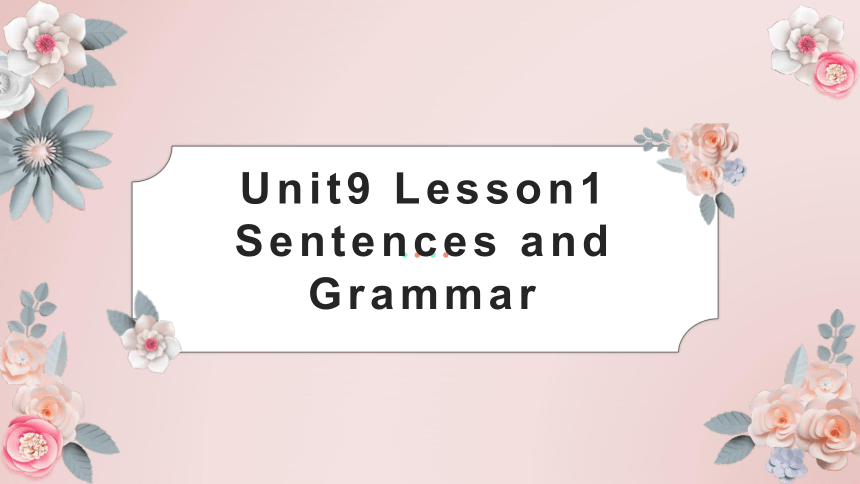 | |
| 格式 | pptx | ||
| 文件大小 | 810.6KB | ||
| 资源类型 | 教案 | ||
| 版本资源 | 北师大版(2019) | ||
| 科目 | 英语 | ||
| 更新时间 | 2023-05-29 22:46:57 | ||
图片预览

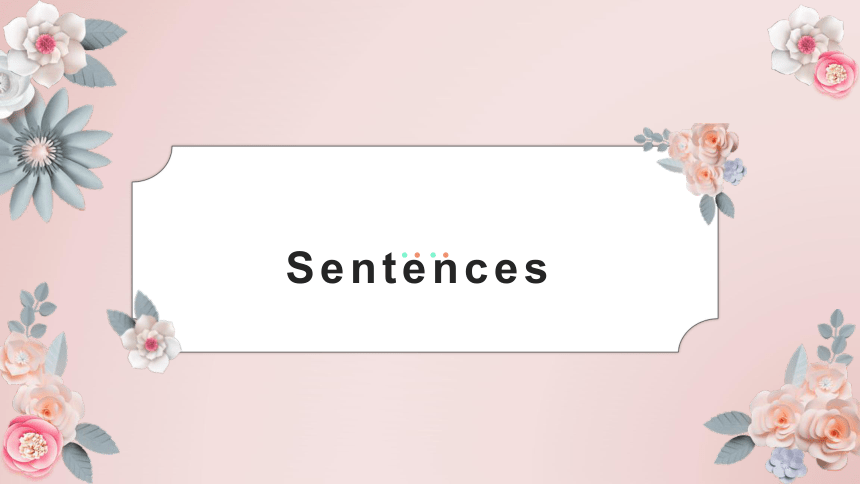

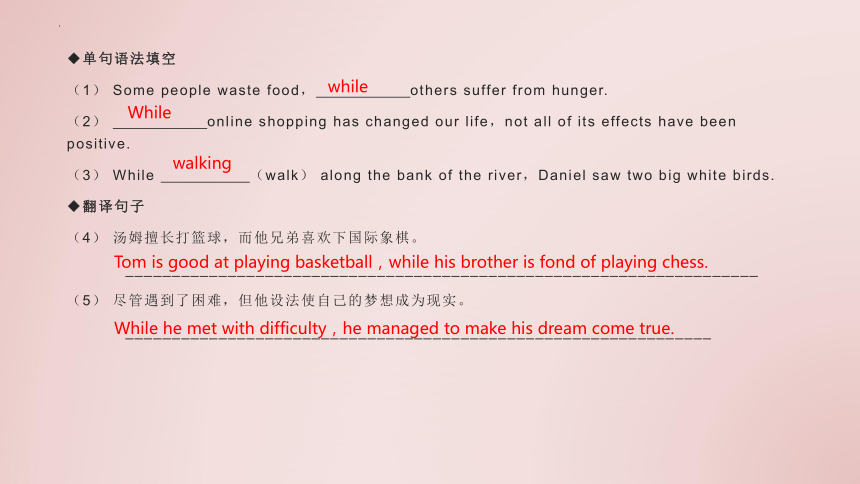

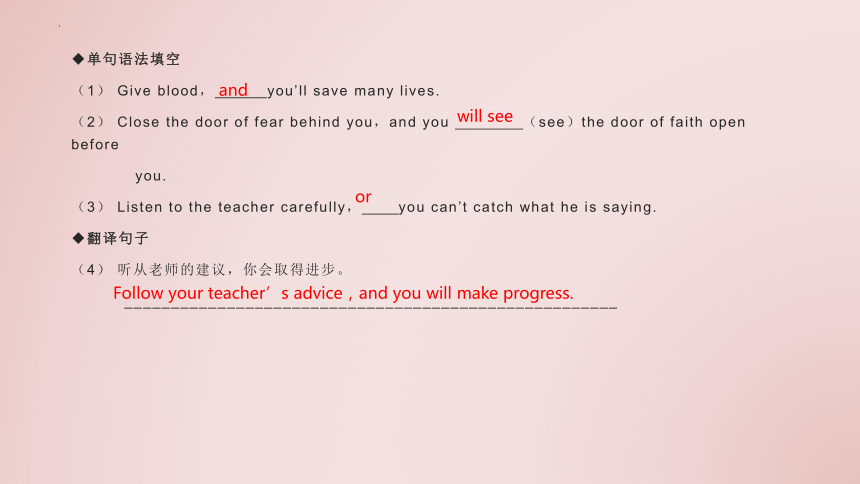
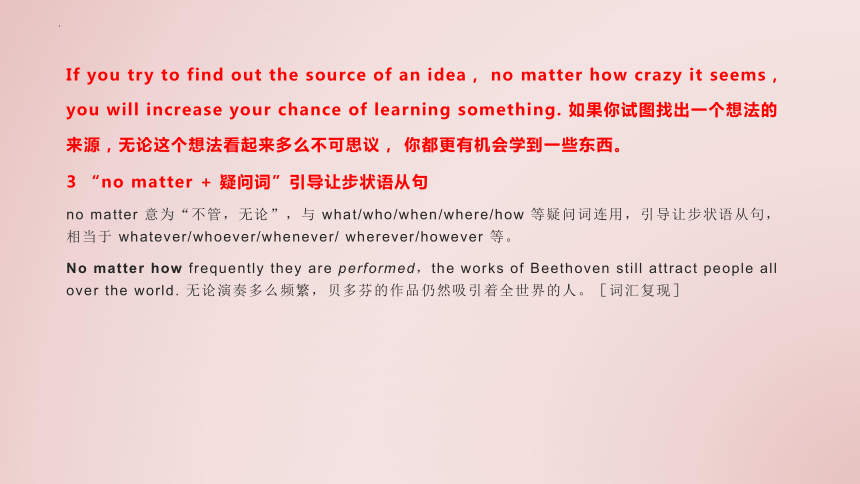

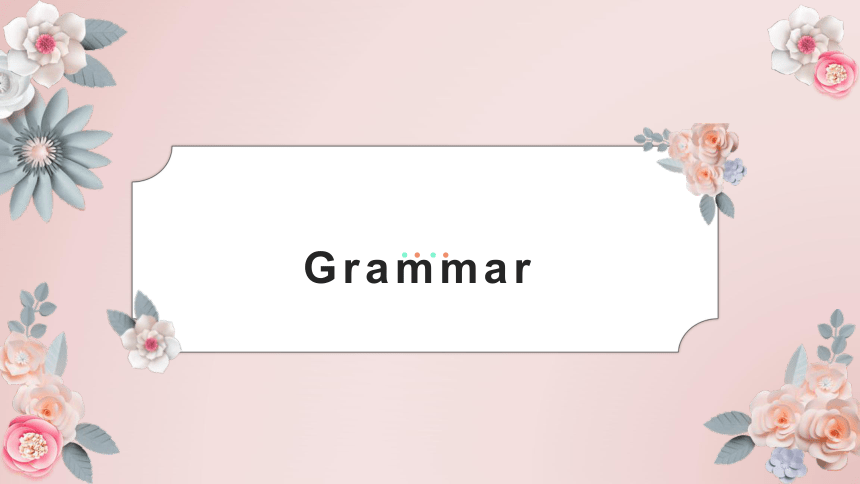
文档简介
(共28张PPT)
Unit9 Lesson1
Sentences and Grammar
Sentences
Your inner voice expresses your personal opinions,while the outer voice tells you about opinions from what you hear or read. 内心的声音表达你的个人意见,而外部的声音告诉你关于听到或者读到的观点。
1 while 连接并列句
while 作并列连词时,意为“而,然而”,表前后意义上的对比。
My father was for my idea,while my mother was against it. 我爸爸支持我的想法,而我妈妈反对。【归纳拓展】(1) while 作从属连词,引导时间状语从句时,意为“当……时”。
While he was in Beijing,he would visit the places of interest. 他在北京时,常去参观名胜古迹。
(2) while 作从属连词,引导让步状语从句时,意为“尽管”,常常置于句首。
While our family was poor,our parents managed to send us to school.
虽然我们家很穷,但我们的父母设法送我们上了学。
◆单句语法填空
(1) Some people waste food, others suffer from hunger.
(2) online shopping has changed our life,not all of its effects have been positive.
(3) While (walk) along the bank of the river,Daniel saw two big white birds.
◆翻译句子
(4) 汤姆擅长打篮球,而他兄弟喜欢下国际象棋。
____________________________________________________________________
(5) 尽管遇到了困难,但他设法使自己的梦想成为现实。
_______________________________________________________________
while
While
walking
Tom is good at playing basketball,while his brother is fond of playing chess.
While he met with difficulty,he managed to make his dream come true.
Be flexible in your opinions and you might end up agreeing with the speaker/writer after all. 灵活处理你的意见,你最终可能会同意说话人或者作者的观点。
2 祈使句 + and/or + 陈述句
在“祈使句 +and/or+ 陈述句”句式中,祈使句表示条件,相当于 if 引导的条件状语从句,陈述句表示结果。表示顺承关系时用 and, 表示转折关系时用 or。该句式中的陈述句常用一般将来时。
Take regular exercise,and you’ll keep fit. = If you take regular exercise,you’ll keep fit.
经常锻炼,你就会保持健康。
Hurry up,or we’ll be late.=If you don’t hurry up,we’ll be late.
抓紧时间,不然我们要迟到了。
◆单句语法填空
(1) Give blood, you’ll save many lives.
(2) Close the door of fear behind you,and you (see)the door of faith open before
you.
(3) Listen to the teacher carefully, you can’t catch what he is saying.
◆翻译句子
(4) 听从老师的建议,你会取得进步。
_____________________________________________________
and
will see
or
Follow your teacher’s advice,and you will make progress.
If you try to find out the source of an idea, no matter how crazy it seems,you will increase your chance of learning something. 如果你试图找出一个想法的来源,无论这个想法看起来多么不可思议, 你都更有机会学到一些东西。
3 “no matter + 疑问词”引导让步状语从句
no matter 意为“不管,无论”,与 what/who/when/where/how 等疑问词连用,引导让步状语从句,相当于 whatever/whoever/whenever/ wherever/however 等。
No matter how frequently they are performed,the works of Beethoven still attract people all over the world. 无论演奏多么频繁,贝多芬的作品仍然吸引着全世界的人。[词汇复现]
◆单句语法填空
(1) happens,you shouldn’t skip any meal of the day.
(2) hard he worked,he couldn’t catch up with his monitor.
(3) We have to finish the task, long it takes.
(4) you live,you’re connected to the ocean.
Whatever
However
however
Wherever
Grammar
接动名词或不定式的动词
1 只接动名词作宾语的动词及动词短语
(1)有些动词(短语)只接动名词作宾语。请牢记下面的口诀:
考虑 建议 盼 原谅(consider,suggest/advise,look forward to,excuse)
承认 推迟没得想(admit,delay/put off,fancy)
避免 错过 继续 练(avoid,miss,keep/keep on,practise)
否认 完成就欣赏(deny,finish,enjoy/appreciate)
禁止 想象才冒险(forbid,imagine,risk)
不禁 介意 准 逃亡(can’t help,mind,allow/permit,escape)
难以忍受 始 反对(can’t stand,get down to,object to)
想要 成功 坚持 忙(feel like,succeed in,stick to/insist on,be busy)
◆单句语法填空
(1) happens,you shouldn’t skip any meal of the day.
(2) hard he worked,he couldn’t catch up with his monitor.
(3) We have to finish the task, long it takes.
(4) you live,you’re connected to the ocean.
Whatever
However
however
Wherever
习惯 放弃 有困难(be used/accustomed to,give up,have difficulty in)
导致 专心 防 道歉(lead to,devote... to,prevent... from,apologise for)
The Smiths are considering moving to a coastal town.
史密斯夫妇正在考虑搬到一个海边小镇。
His mother suggested buying a new car. 他妈妈建议买一辆新的汽车。
I can’t put off going to the dentist any longer.
我不能再拖着不去看牙医了。
They succeeded in climbing the tallest mountain in the world.
他们成功爬上了世界最高峰。
Shirley is busy going over lessons for the coming examination.
雪莉正忙着为即将到来的考试复习功课。
Mother Teresa devoted herself to helping the poor,the sick and the homeless. 特蕾莎修女致力于帮助穷人、病人和无家可归的人。
Nothing can prevent us from making our dreams come true.
没有什么能阻止我们实现梦想。[词汇复现]
(2)后接动名词的主动形式表示被动意义的动词
在表示“ 需要”“ 值得”等含义的动词如need,want,require, deserve 等后面,常接动名词的主动形式表示被动意义,相当于不定式的被动形式。即:
need/want/require doing = need/want/require to be done(某事)需要被做
deserve doing = deserve to be done 应受……
The flowers in his garden want watering/to be watered.
他花园里的花需要浇水了。
【误区警示】
be worth 后必须用动名词的主动形式表示被动意义。be worthy 后须用不定式的被动形式,也可先接of 再接动名词的被动形式。
The palace is worth protecting. =The palace is worthy to be protected. =The palace is worthy of being protected. 这座宫殿值得保护。
(3)用it 作形式宾语
用于“动词+it+ 宾补+doing sth”结构中。
六个常用动词:make,feel,find,consider,believe,think
常用宾补:useless,no use,no good,no pleasure,a waste of time
◆单句语法填空
(1) Nobody should delay (hand)in the essay.
(2) She admitted (take) away the money in the drawer.
(3) Try to avoid (make)mistakes while giving the description about the case.
(4) She insisted on (check)every-thing herself.
(5) I appreciate (get)such a good chance to improve my academic level.
(6) I can’t help (be)angry about his rude behaviour.
(7) If you think you are sick you should not put off (go)to the doctor.
handing
taking
making
checking
getting
being
going
(8) They objected to (leave)in such a hurry.
(9) Do you feel like (have)a word with him and trying to clear up the misunder-
standing
(10)I’m going to get down to (study) English this term.
(11)We look forward to ________________(bring)in new technology.
(12)Your car is dirty,and it needs ____________________( wash).
(13)The problem requires ____________________ (deal) with at once.
(14)Dr. Yuan Longping really deserves ____________________( give) so many awards.
leaving
having
studying
bringing
washing/to be washed
dealing/to be dealt
giving/to be given
(15)This book is worth (read) a second time.
(16)The old car is not worthy_______________(repair).
=The old car is not worthy of ________________(repair).
(17)Suddenly I feel it is no pleasure (draw) cartoons day after day.
(18)[词汇复现]I consider it no use (complain) without taking action.
(19)My parents consider it no good ( make) friends with those who are crazy
about playing video games.
(20)Peter believes it a waste of time ( play) chess.
reading
to be repaired
being repaired
drawing
complaining
making
playing
2 只接不定式短语作宾语的动词
(1)有些动词只接不定式作宾语。请牢记下面的口诀:
决心 学会 想 希望(decide/determine,learn,want,expect/hope/wish)
拒绝 设法 愿 假装(refuse,manage,care,pretend)
主动 答应 选 计划(offer,promise,choose,plan)
同意 请求 帮一帮(agree,ask/beg,help)
They determined to face the crisis cheerfully. 他们决定乐观地面对危机。
Mr King refused to change his mind.金先生拒绝改变主意。
She has promised to do all she can to help.她答应尽力帮忙。
(2)用it 作形式宾语
不定式作宾语时,如果还带有宾补,常用it 作形式宾语,而把不定式放在宾补之后。常用句型:主语+ make/feel/find/consider/believe/ think +it+ 形容词/ 名词+to do sth。
I feel it an honour to be invited. 能受到邀请,我感到很荣幸。
I find it difficult to speak English fluently.
我发现要能流利地说英语是很难的。
【误区警示】
介词后一般要接动名词作宾语,但介词but,except 后接不定式作宾语。如果but,except 之前有实义动词do,则不定式要省略to;但如果but,except 之前没有实义动词do,则其后的不定式一般要带to。助记:前有do,后无to;前无do,后有to。
I have nothing to do but depend on myself.
我没有办法,只好依靠自己。
He has no choice but to give in. 除了让步,他别无选择。
◆单句语法填空
(1) When his father stepped into his room,he pretended __________________(study).
(2) All the people in the world expect ( live) in a peaceful country.
(3) He still refused (give)a statement to the police although he had been put into prison.
(4) I have offered (paint) the house in exchange for a week’s accommodation.
(5) Tony had no choice but (accept) the fact that he failed in the exam.
(6) Laura did nothing this weekend but ( stay) at home watching TV.
◆完成句子
(7)We all (认为这很遗憾) for Holland to lose the match.
(8) He (把读…… 当成常规) English aloud every morning.
to be studying
to live
to give
to paint
to accept
stay
think it a pity
makes it a rule to read
3 既可接动名词又可接不定式作宾语的动词及动词 短语
( 1)下列动词(短语)既可以接动名词作宾语,也可以接不定式作宾语,但意义上有很大区别。
doing sth 忘记做过某事
to do sth 忘记去做某事
doing sth 记得做过某事
to do sth 记得去做某事
doing sth 后悔做过某事
to do sth 遗憾地去做某事
doing sth 停止做某事
to do sth 停下来去做某事
doing sth 尝试做某事
to do sth 努力做某事
forget
remember
regret
stop
try
doing sth 意味着做某事
to do sth 意欲/ 打算做某事
doing sth 禁不住做某事
to do sth 不能帮助做某事
doing sth 继续做某事(同一件事)
to do sth 继续做某事(另一件事)
I forget telling him the news this morning. 我忘记今天早上已经告诉他这个消息了。
I forget to tell him the news this morning. 我忘了今天早上告诉他这个消息。
I remember seeing her somewhere before. 我记得以前在某个地方见过她。
Please remember to give me a phone call when you get there.
当你到达那里时,请记得给我打个电话。
mean
can’t help
go on
( 2)动词like,dislike,hate,love,prefer 后接动名词和不定式作宾语均可。如果表示经常性的习惯行为,常用动名词;如果表示具体的一次性的行为,常用不定式。
I like swimming,but I don’t like to swim this afternoon. 我喜欢游泳,但今天下午我不想游泳。
Cross talks are an art form people love seeing and hearing. 相声是一种人们喜闻乐见的艺术形式。
( 3)动词begin,start 后接动名词和不定式作宾语时意义差别不大, 但在以下三种情况下,只接不定式:
(1) begin,start 的主语是物时。
(2) begin,start 本身用于进行时态时。
(3) begin,start 后接的是表示人的精神状况或心理活动的动词,如 feel,realise,understand,wonder,know 等时。
The horse began to run fast. 那匹马开始跑得快起来。
She was beginning to feel easy. 她开始觉得安心了。
They were walking so slowly that I began to feel bored. 他们走得非常慢,我开始感到厌烦了。
◆单句语法填空
(1) I remember (see) her some-where,but her name escapes me now.
(2) My boy,do remember (leave) things where you can find them again.
(3) Do you still remember (take) to Guilin when you were only five
(4) Hearing the joke,the children couldn’t help (laugh).
(5) Jack is very busy,so he can’t help ( do) the work this afternoon.
(6) He saved a drowning boy from the river. I couldn’t help but (admire) him.
seeing
to leave
being taken
laughing
to do
admiring
(7) Do you regret (drop) out of school at such a young age
(8) I regret (tell) you that you haven’t been accepted into our company.
(9) The passers-by stopped (enjoy) the beautiful flowers when they passed by.
(10)Please stop (talk). It is time for us to listen to the tape.
(11)Don’t forget (turn)off the light when you leave the room.
(12)I’m sorry for what I have done. I didn’t mean (make)you embarrassed.
(13)Some teenagers prefer (stay) at home to going out to play.
dropping
to tell
to enjoy
talking
to turn
to make
staying
(14)Some teenagers prefer (stay) at home rather than go out to play.
(15)Some people hate (work) in the early morning.
(16)My grandfather started ______________(talk) about the old days.
(17)Robert was beginning _________________(understand) the seriousness of life.
(18)When the sun started (go) down,he stopped and set up his tent.
(19)Norma began (realise) that he had misunderstood his friend.
to stay
working
talking/to talk
to understand
to go
to realise
Thank You
Unit9 Lesson1
Sentences and Grammar
Sentences
Your inner voice expresses your personal opinions,while the outer voice tells you about opinions from what you hear or read. 内心的声音表达你的个人意见,而外部的声音告诉你关于听到或者读到的观点。
1 while 连接并列句
while 作并列连词时,意为“而,然而”,表前后意义上的对比。
My father was for my idea,while my mother was against it. 我爸爸支持我的想法,而我妈妈反对。【归纳拓展】(1) while 作从属连词,引导时间状语从句时,意为“当……时”。
While he was in Beijing,he would visit the places of interest. 他在北京时,常去参观名胜古迹。
(2) while 作从属连词,引导让步状语从句时,意为“尽管”,常常置于句首。
While our family was poor,our parents managed to send us to school.
虽然我们家很穷,但我们的父母设法送我们上了学。
◆单句语法填空
(1) Some people waste food, others suffer from hunger.
(2) online shopping has changed our life,not all of its effects have been positive.
(3) While (walk) along the bank of the river,Daniel saw two big white birds.
◆翻译句子
(4) 汤姆擅长打篮球,而他兄弟喜欢下国际象棋。
____________________________________________________________________
(5) 尽管遇到了困难,但他设法使自己的梦想成为现实。
_______________________________________________________________
while
While
walking
Tom is good at playing basketball,while his brother is fond of playing chess.
While he met with difficulty,he managed to make his dream come true.
Be flexible in your opinions and you might end up agreeing with the speaker/writer after all. 灵活处理你的意见,你最终可能会同意说话人或者作者的观点。
2 祈使句 + and/or + 陈述句
在“祈使句 +and/or+ 陈述句”句式中,祈使句表示条件,相当于 if 引导的条件状语从句,陈述句表示结果。表示顺承关系时用 and, 表示转折关系时用 or。该句式中的陈述句常用一般将来时。
Take regular exercise,and you’ll keep fit. = If you take regular exercise,you’ll keep fit.
经常锻炼,你就会保持健康。
Hurry up,or we’ll be late.=If you don’t hurry up,we’ll be late.
抓紧时间,不然我们要迟到了。
◆单句语法填空
(1) Give blood, you’ll save many lives.
(2) Close the door of fear behind you,and you (see)the door of faith open before
you.
(3) Listen to the teacher carefully, you can’t catch what he is saying.
◆翻译句子
(4) 听从老师的建议,你会取得进步。
_____________________________________________________
and
will see
or
Follow your teacher’s advice,and you will make progress.
If you try to find out the source of an idea, no matter how crazy it seems,you will increase your chance of learning something. 如果你试图找出一个想法的来源,无论这个想法看起来多么不可思议, 你都更有机会学到一些东西。
3 “no matter + 疑问词”引导让步状语从句
no matter 意为“不管,无论”,与 what/who/when/where/how 等疑问词连用,引导让步状语从句,相当于 whatever/whoever/whenever/ wherever/however 等。
No matter how frequently they are performed,the works of Beethoven still attract people all over the world. 无论演奏多么频繁,贝多芬的作品仍然吸引着全世界的人。[词汇复现]
◆单句语法填空
(1) happens,you shouldn’t skip any meal of the day.
(2) hard he worked,he couldn’t catch up with his monitor.
(3) We have to finish the task, long it takes.
(4) you live,you’re connected to the ocean.
Whatever
However
however
Wherever
Grammar
接动名词或不定式的动词
1 只接动名词作宾语的动词及动词短语
(1)有些动词(短语)只接动名词作宾语。请牢记下面的口诀:
考虑 建议 盼 原谅(consider,suggest/advise,look forward to,excuse)
承认 推迟没得想(admit,delay/put off,fancy)
避免 错过 继续 练(avoid,miss,keep/keep on,practise)
否认 完成就欣赏(deny,finish,enjoy/appreciate)
禁止 想象才冒险(forbid,imagine,risk)
不禁 介意 准 逃亡(can’t help,mind,allow/permit,escape)
难以忍受 始 反对(can’t stand,get down to,object to)
想要 成功 坚持 忙(feel like,succeed in,stick to/insist on,be busy)
◆单句语法填空
(1) happens,you shouldn’t skip any meal of the day.
(2) hard he worked,he couldn’t catch up with his monitor.
(3) We have to finish the task, long it takes.
(4) you live,you’re connected to the ocean.
Whatever
However
however
Wherever
习惯 放弃 有困难(be used/accustomed to,give up,have difficulty in)
导致 专心 防 道歉(lead to,devote... to,prevent... from,apologise for)
The Smiths are considering moving to a coastal town.
史密斯夫妇正在考虑搬到一个海边小镇。
His mother suggested buying a new car. 他妈妈建议买一辆新的汽车。
I can’t put off going to the dentist any longer.
我不能再拖着不去看牙医了。
They succeeded in climbing the tallest mountain in the world.
他们成功爬上了世界最高峰。
Shirley is busy going over lessons for the coming examination.
雪莉正忙着为即将到来的考试复习功课。
Mother Teresa devoted herself to helping the poor,the sick and the homeless. 特蕾莎修女致力于帮助穷人、病人和无家可归的人。
Nothing can prevent us from making our dreams come true.
没有什么能阻止我们实现梦想。[词汇复现]
(2)后接动名词的主动形式表示被动意义的动词
在表示“ 需要”“ 值得”等含义的动词如need,want,require, deserve 等后面,常接动名词的主动形式表示被动意义,相当于不定式的被动形式。即:
need/want/require doing = need/want/require to be done(某事)需要被做
deserve doing = deserve to be done 应受……
The flowers in his garden want watering/to be watered.
他花园里的花需要浇水了。
【误区警示】
be worth 后必须用动名词的主动形式表示被动意义。be worthy 后须用不定式的被动形式,也可先接of 再接动名词的被动形式。
The palace is worth protecting. =The palace is worthy to be protected. =The palace is worthy of being protected. 这座宫殿值得保护。
(3)用it 作形式宾语
用于“动词+it+ 宾补+doing sth”结构中。
六个常用动词:make,feel,find,consider,believe,think
常用宾补:useless,no use,no good,no pleasure,a waste of time
◆单句语法填空
(1) Nobody should delay (hand)in the essay.
(2) She admitted (take) away the money in the drawer.
(3) Try to avoid (make)mistakes while giving the description about the case.
(4) She insisted on (check)every-thing herself.
(5) I appreciate (get)such a good chance to improve my academic level.
(6) I can’t help (be)angry about his rude behaviour.
(7) If you think you are sick you should not put off (go)to the doctor.
handing
taking
making
checking
getting
being
going
(8) They objected to (leave)in such a hurry.
(9) Do you feel like (have)a word with him and trying to clear up the misunder-
standing
(10)I’m going to get down to (study) English this term.
(11)We look forward to ________________(bring)in new technology.
(12)Your car is dirty,and it needs ____________________( wash).
(13)The problem requires ____________________ (deal) with at once.
(14)Dr. Yuan Longping really deserves ____________________( give) so many awards.
leaving
having
studying
bringing
washing/to be washed
dealing/to be dealt
giving/to be given
(15)This book is worth (read) a second time.
(16)The old car is not worthy_______________(repair).
=The old car is not worthy of ________________(repair).
(17)Suddenly I feel it is no pleasure (draw) cartoons day after day.
(18)[词汇复现]I consider it no use (complain) without taking action.
(19)My parents consider it no good ( make) friends with those who are crazy
about playing video games.
(20)Peter believes it a waste of time ( play) chess.
reading
to be repaired
being repaired
drawing
complaining
making
playing
2 只接不定式短语作宾语的动词
(1)有些动词只接不定式作宾语。请牢记下面的口诀:
决心 学会 想 希望(decide/determine,learn,want,expect/hope/wish)
拒绝 设法 愿 假装(refuse,manage,care,pretend)
主动 答应 选 计划(offer,promise,choose,plan)
同意 请求 帮一帮(agree,ask/beg,help)
They determined to face the crisis cheerfully. 他们决定乐观地面对危机。
Mr King refused to change his mind.金先生拒绝改变主意。
She has promised to do all she can to help.她答应尽力帮忙。
(2)用it 作形式宾语
不定式作宾语时,如果还带有宾补,常用it 作形式宾语,而把不定式放在宾补之后。常用句型:主语+ make/feel/find/consider/believe/ think +it+ 形容词/ 名词+to do sth。
I feel it an honour to be invited. 能受到邀请,我感到很荣幸。
I find it difficult to speak English fluently.
我发现要能流利地说英语是很难的。
【误区警示】
介词后一般要接动名词作宾语,但介词but,except 后接不定式作宾语。如果but,except 之前有实义动词do,则不定式要省略to;但如果but,except 之前没有实义动词do,则其后的不定式一般要带to。助记:前有do,后无to;前无do,后有to。
I have nothing to do but depend on myself.
我没有办法,只好依靠自己。
He has no choice but to give in. 除了让步,他别无选择。
◆单句语法填空
(1) When his father stepped into his room,he pretended __________________(study).
(2) All the people in the world expect ( live) in a peaceful country.
(3) He still refused (give)a statement to the police although he had been put into prison.
(4) I have offered (paint) the house in exchange for a week’s accommodation.
(5) Tony had no choice but (accept) the fact that he failed in the exam.
(6) Laura did nothing this weekend but ( stay) at home watching TV.
◆完成句子
(7)We all (认为这很遗憾) for Holland to lose the match.
(8) He (把读…… 当成常规) English aloud every morning.
to be studying
to live
to give
to paint
to accept
stay
think it a pity
makes it a rule to read
3 既可接动名词又可接不定式作宾语的动词及动词 短语
( 1)下列动词(短语)既可以接动名词作宾语,也可以接不定式作宾语,但意义上有很大区别。
doing sth 忘记做过某事
to do sth 忘记去做某事
doing sth 记得做过某事
to do sth 记得去做某事
doing sth 后悔做过某事
to do sth 遗憾地去做某事
doing sth 停止做某事
to do sth 停下来去做某事
doing sth 尝试做某事
to do sth 努力做某事
forget
remember
regret
stop
try
doing sth 意味着做某事
to do sth 意欲/ 打算做某事
doing sth 禁不住做某事
to do sth 不能帮助做某事
doing sth 继续做某事(同一件事)
to do sth 继续做某事(另一件事)
I forget telling him the news this morning. 我忘记今天早上已经告诉他这个消息了。
I forget to tell him the news this morning. 我忘了今天早上告诉他这个消息。
I remember seeing her somewhere before. 我记得以前在某个地方见过她。
Please remember to give me a phone call when you get there.
当你到达那里时,请记得给我打个电话。
mean
can’t help
go on
( 2)动词like,dislike,hate,love,prefer 后接动名词和不定式作宾语均可。如果表示经常性的习惯行为,常用动名词;如果表示具体的一次性的行为,常用不定式。
I like swimming,but I don’t like to swim this afternoon. 我喜欢游泳,但今天下午我不想游泳。
Cross talks are an art form people love seeing and hearing. 相声是一种人们喜闻乐见的艺术形式。
( 3)动词begin,start 后接动名词和不定式作宾语时意义差别不大, 但在以下三种情况下,只接不定式:
(1) begin,start 的主语是物时。
(2) begin,start 本身用于进行时态时。
(3) begin,start 后接的是表示人的精神状况或心理活动的动词,如 feel,realise,understand,wonder,know 等时。
The horse began to run fast. 那匹马开始跑得快起来。
She was beginning to feel easy. 她开始觉得安心了。
They were walking so slowly that I began to feel bored. 他们走得非常慢,我开始感到厌烦了。
◆单句语法填空
(1) I remember (see) her some-where,but her name escapes me now.
(2) My boy,do remember (leave) things where you can find them again.
(3) Do you still remember (take) to Guilin when you were only five
(4) Hearing the joke,the children couldn’t help (laugh).
(5) Jack is very busy,so he can’t help ( do) the work this afternoon.
(6) He saved a drowning boy from the river. I couldn’t help but (admire) him.
seeing
to leave
being taken
laughing
to do
admiring
(7) Do you regret (drop) out of school at such a young age
(8) I regret (tell) you that you haven’t been accepted into our company.
(9) The passers-by stopped (enjoy) the beautiful flowers when they passed by.
(10)Please stop (talk). It is time for us to listen to the tape.
(11)Don’t forget (turn)off the light when you leave the room.
(12)I’m sorry for what I have done. I didn’t mean (make)you embarrassed.
(13)Some teenagers prefer (stay) at home to going out to play.
dropping
to tell
to enjoy
talking
to turn
to make
staying
(14)Some teenagers prefer (stay) at home rather than go out to play.
(15)Some people hate (work) in the early morning.
(16)My grandfather started ______________(talk) about the old days.
(17)Robert was beginning _________________(understand) the seriousness of life.
(18)When the sun started (go) down,he stopped and set up his tent.
(19)Norma began (realise) that he had misunderstood his friend.
to stay
working
talking/to talk
to understand
to go
to realise
Thank You
同课章节目录
- Unit 7 Art
- Lesson 1 Masterpieces
- Lesson 2 Beijing Opera
- Lesson 3 A Musical Genius
- Unit 8 Green living
- Lesson 1 Roots and Shoots
- Lesson 2 Greening the Desert
- Lesson 3 "White Bikes" on the Road
- Unit 9 Learning
- Lesson 1 Active Learning
- Lesson 2 Language Learning Tips
- Lesson 3 The Secrets of Your Memory
